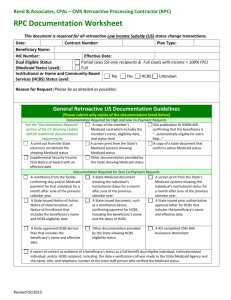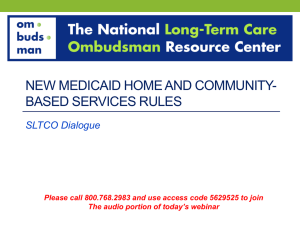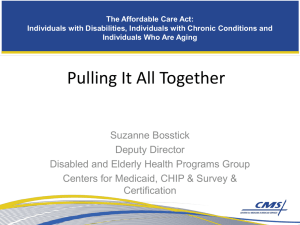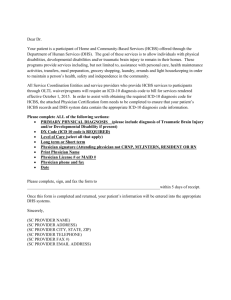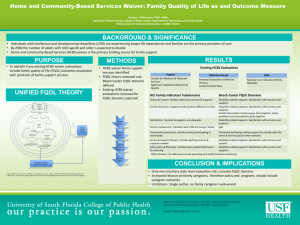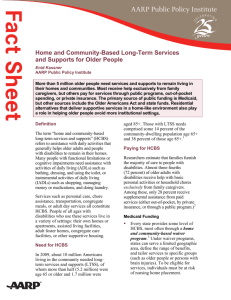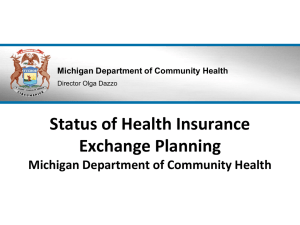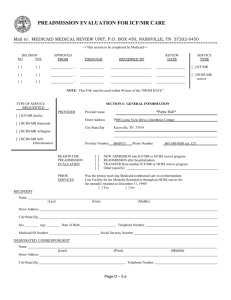Chart Pack
advertisement
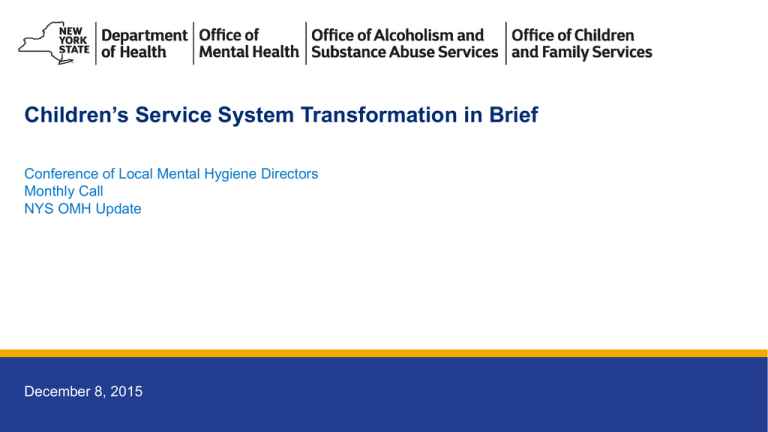
Children’s Service System Transformation in Brief Conference of Local Mental Hygiene Directors Monthly Call NYS OMH Update December 8, 2015 December 8, 2015 Medicaid Redesign Team’s Vision, Goals and Principles for Transforming the Delivery of Heath Care for Children Keep children on their developmental trajectory Focus on recovery and building resilience Identify needs early and intervene Maintain child at home with support and services Maintain the child in the community in least restrictive settings Prevent escalation and longer term need for higher end services Maintain accountability for outcomes and quality Maintain and expand access to services for children without Medicaid as a “Household of One” 2 December 8, 2015 3 The GOAL is to… Get children back on their developmental trajectory: • • • • Identify needs early Maintain the child at home with support and services Maintain the child in the community, in least restrictive settings Prevent longer term need for higher end services Focus on recovery and building resilience! December 8, 2015 4 Children’s Timeline Overview December 8, 2015 Children’s Transition Timeline • Children will begin to enroll in Health Homes Designated to Serve Children on September 1, 2016. • OMH TCM providers and legacy clients will transition on September 1st as well. • The transition of care coordination services of the five 1915c children’s Waivers (OMH SED, DOH Care at Home I/II, OCFS Bridges to Health) to Health Home will not occur until 2017. • The newly proposed health and behavioral health Medicaid State Plan services will be implemented as soon as possible pending approval from CMS in 2016. The services will transition to Managed Care in 2017. Geographic Phase In • January 1, 2017 – NYC and Long Island Children's Transition to Managed Care • July 1, 2017 – Rest of State Children's Transition to Managed Care 5 December 8, 2015 Children’s Transition Timelines - continued • In 2017, currently carved out Medicaid behavioral health services and children in foster care will be moved to Managed Care • The existing Home and Community Based Services (HCBS) that are in the five 1915c children’s Waivers (OMH SED, DOH CAH I/II, OCFS B2H) will be aligned to one array of HCBS benefits, pending CMS approval, and will be moved to Managed Care. As a result of this transition, the 1915c Waivers will be discontinued as separate programs once the transition is complete. • Children enrolled in the 1915c Waivers on January 1 and July 1, 2017, will transition to Managed Care and continue receiving HCBS benefits as per their service plan for 90 days, before service plan review by the Plans • In 2017, newly identified children meeting Level of Care criteria may begin to receive HCBS benefits. • In 2018, children meeting Level of Need criteria will begin to receive HCBS benefits (January for children with Medicaid; July for children who meet “family of one” Medicaid) 6 December 8, 2015 Enrollment of Children in Health Homes • Children who have no access to care coordination can access it • There will be one single model for care coordination of children, integrating physical and behavioral health • OMH TCM providers and the children they serve will transition to Health Home in 2016 • HCBS Waiver care managers and the children they serve will transition to Health Home when the managed care transition occurs in 2017 • Update on the Implementation of Health Homes for Children – Webinar coming on December 16, 10:00-12:00 7 December 8, 2015 OASAS Service Changes • Clinic to Rehabilitation Designation Change - services where kids and families are • LOCADTR-3 - adolescent version • Residential Redesign - Medicaid reimbursement • Access to all SPA services • Health Home access for eligible youth • HCBS access for eligible youth • Family/Peer supports 8 December 8, 2015 9 Looking a Little More Closely Children’s State Plan Amendment December 8, 2015 Implementation of new Medicaid SPA Services • New York will have more Medicaid service options available to intervene earlier when a child and family experiences behavioral health and other challenges • Available to all Medicaid eligible children who meet medical necessity criteria • New York will be able to reimburse Evidence Based Practices through Medicaid • Unlicensed practitioners, as well as licensed practitioners, will be able to deliver new services • Family and youth peers will be able to provide services under Medicaid authority 10 December 8, 2015 Current Action Steps - prior to Submission to CMS • Rate development • Finalization of Evidence Based Practice Designation process • Regulation development • Finalization of Provider Designation Process • Finalizing SPA Provider Manual 11 December 8, 2015 Proposed New Medicaid State Plan Services • Crisis Intervention • Community Psychiatric Supports and Treatment (CPST) • Other Licensed Practitioner • Psychosocial Rehabilitation Services • Family Peer Support Services • Youth Peer Advocacy and Training 12 December 8, 2015 SPA Services Distinction Chart provided to call participants detailing unique features of each service along with case examples of how the services might address individual needs. 13 December 8, 2015 Crisis Intervention • 24/7 availability with one hour response time • Mobile team-based service in the community where crisis is occurring • For a child and his/her family/caregiver who is experiencing a psychiatric or substance use crisis • Intended to interrupt and/or ameliorate a crisis experience including an assessment, immediate crisis resolution and deescalation, development of a safety plan, and referral/follow up to additional supports 14 December 8, 2015 Family Peer Support and Youth Peer Advocacy and Training • Services provided by a certified and trained peer with lived experience • Family Peer Support Services - array of formal and informal services and supports provided to families caring for/raising a child who is experiencing social, emotional, developmental, substance use and/or behavioral challenges • Youth Peer Advocacy and Training Services – services that provide the training and support necessary to ensure engagement and active participation of the youth in the treatment planning process and with the ongoing skill development learned throughout the treatment process 15 December 8, 2015 Community Psychiatric Supports and Treatment (CPST) • Goal-directed supports and solution-focused interventions intended to achieve identified goals or objectives as set forth in the child’s plan of care. • Face to face intervention, which may include collateral contact • Delivery in the community by unlicensed practitioner • Includes the delivery of authorized Evidence Based Practices 16 December 8, 2015 Psychosocial Rehabilitation Services • Implement interventions outlined on a treatment plan to compensate for or eliminate functional deficits and interpersonal and/or environmental barriers associated with a child/youth’s behavioral health needs • Intent is to restore the fullest possible integration of the individual as an active and productive member of his or her family, community and/or culture with the least amount of ongoing professional intervention • Delivered by unlicensed practitioner, under clinical supervision 17 December 8, 2015 Other Licensed Practitioner • A licensed behavioral health practitioner, licensed in the State of New York to prescribe, diagnose and/or treat individuals with mental illness or substance abuse operating within the scope of practice defined in State law and in any setting permissible under State practice law. • Will include individuals licensed as: Registered Professional Nurse, Licensed Nurse Practitioner, Licensed Psychologist, Licensed Social worker (LMSW, LCSW), and Licensed Mental Health Counselor 18 December 8, 2015 SPA Provider Manual • Service Definitions • Allowable Activities • Modality (e.g., face-to-face individual or group) • Setting • Admission/Discharge Criteria (i.e., medical necessity) • Limitations/Exclusions • Agency/Staff/Supervisor Qualifications • Training 19 December 8, 2015 20 What is the 1115 and Why Amend? December 8, 2016 New York’s 1115 Partnership Plan • Approved in 1997 • Federal authority to operate a Managed Care Delivery System • Amendments required with transition of new populations or services and/or development of new demonstrations or services • Children’s amendment to be submitted to CMS in early 2016 21 December 8, 2015 Many changes result from the 1115 • Existing behavioral health services will transition to Medicaid managed care, including newest six children’s services • Children in foster care will transition to Medicaid managed care • The HCBS benefits of the five children’s 1915c Waivers will be aligned into one array of benefits • A new expansion eligibility group who meet a Level of Need targeting and functional criteria will be created • For children meeting LON and Level of Care and who do not qualify, Medicaid eligibility will be considered as a household of one without regard to parental income • For children with Medicaid as a household of one access to HCBS benefits will be paid via fee-for-service • The 1915c Waivers will be discontinued when the transition is complete 22 December 8, 2015 23 Proposed Home and Community Based Services – 2017 • Habilitative Skill Building • Caregiver/Family Support Services • Prevocational Services • Supported Employment Service • Community Advocacy and Support • Non-Medical Transportation • Day Habilitation • Respite (Crisis & Planned) • Adaptive and Assistive Equipment • Accessibility Modifications • Palliative Care (includes Family Palliative Care Education, Bereavement, Massage and Expressive Therapy, and Pain and Symptom Management) • Care Coordination (for children not eligible for Health Home, CMS requires care plans for children that receive HCBS services) Reflects “alignment” of all HCBS services available under different 1915c Waiver Programs (OMH SED, OCFS Bridges to Health & DOH Care at Home I/II) Requires CMS Approval of 1115 Amendment for Managed Care More tools in the tool box: HCBS available to larger population of children (no longer limited to waiver slots) Broader array of HCBS available, at the same time 1915c Waiver Programs are discontinued December 8, 2015 Children’s HCBS Eligibility To be eligible for HCBS benefits, children must meet: • target criteria • functional criteria and • Medicaid financial eligibility 24 December 8, 2015 Children’s HCBS Target Populations Children and youth younger than 21 • With Serious Emotional Disturbance (SED); or • Placed in Foster Care who have SED, are Developmentally Disabled or Medically Fragile, or have experienced abuse, neglect or maltreatment; or • Who are physically disabled and require significant medical or technological health supports; or • With Substance Use Disorders 25 December 8, 2015 26 Children’s HCBS Functional Criteria Level of Care (LOC)– criteria met and determined by assessment that would indicate a child is eligible for or at risk of medical institutional placement in a facility licensed by NYS OMH, Intermediate Care Facility for the Mentally Retarded (ICF/MR), or skill nursing facility/Hospital. Current criteria for children’s 1915(c) Waivers. NEW Expansion Population: Level of Need (LON)– criteria met and determined by assessment that would indicate a child has needs that cannot be met only by nonmedical institutional State Plan Services, but who does not qualify for Level of Care. Both levels determined by CANS-NY (Child and Adolescent Needs and Strengths Assessment) and its algorithms. December 8, 2015 One Array of Children’s HCBS Benefits Managed in two ways: Medicaid Managed Care AND Medicaid Fee for Service program 27 December 8, 2015 Children with Community Medicaid • Will be enrolled in Medicaid Managed Care • Can access Health Home Care Management if they meet eligibility criteria • Can access the full array SPA services if they meet medical necessity for any of the services • Can access HCBS benefits if they meet targeting and LOC or LON criteria (determined by completing the CANS-NY) 28 December 8, 2015 Children with Comprehensive TPHI • Excluded from Managed Care if they are eligible for Medicaid • Comprehensive TPHI (Third Party Health Insurance) includes those with commercial coverage, dual Medicaid/Medicare or Medicaid spend down • Children with Comprehensive TPHI have access to HCBS Waiver Services today via targeting and functional criteria (LOC) in the 1915c Waivers (OMH SED, OCFS B2H, DOH CAH I/II) • Goal to maintain benefit availability to children meeting LOC criteria and expand to children meeting LON criteria • If eligible for HCBS benefits, will access through separate but equal system (Fee for Service) of benefits 29 December 8, 2015 Role of the County/City Government in HCBS Eligibility Determination 30 December 8, 2015 31 HCBS Eligibility Dilemmas and Proposed Solution New York’s goal is to maintain and expand availability of HCBS benefits for children who need them. • Problem: Children without Medicaid cannot enroll in a Health Home, which determines HCBS eligibility • Problem: A determination of HCBS targeting and functional criteria must be completed to enable Medicaid financial eligibility determination as a “family of one” • Proposal Solution: Development of local Independent Entity function for “family of one” children December 8, 2015 32 Independent Entity (IE) Functions and Responsibilities 1. Establish a single phone number or physical location for children and families requesting HCBS benefits 2. The IE will • conduct a telephonic or in-person Eligibility Evaluation Screen to determine HCBS presumptive eligibility for those children without Medicaid; • Enter the Screen question data into the Uniform Assessment System (UAS) on the NYS DOH Health Commerce System (HCS); and • Attest to HCBS Presumptive Eligibility Determination based on target and functional criteria. 3. The IE will develop a provisional plan of care, to include the immediate HCBS benefits that could meet family needs and/or referral to Health Home 4. The IE refers the family to file a Medicaid application with LDSS (HRA) with verification of HCBS presumptive eligibility. December 8, 2015 33 Independent Entity (IE) Functions and Responsibilities – (continued) 6. The IE should verify Medicaid eligibility for those children screened until which time that Medicaid eligibility has been determined. 7. Once Medicaid eligibility is established based on family of one financial methodology, the IE should inform the family that they are provisionally eligible for HCBS benefits, the child has been determined Medicaid eligible and ask if they can be referred to Health Home for care coordination services. 8. If consent is given, the IE enters MAPP via the UAS and completes Health Home referral and transmits the HCBS Eligibility verification and Provisional Plan of Care (POC). December 8, 2015 34 Provider Designation Processes December 8, 2015 SPA Provider Designation Process • Must be a licensed, certified or designated provider of OMH, OASAS, OCFS or DOH within specific parameters • Process under development, including technical assistance for current non-Medicaid providers (Family and Youth Peers) 35 December 8, 2015 Children’s HCBS Provider Designation • Grandfathering of current children’s 1915c HCBS providers • Expansion of designation for current children’s HCBS providers • Application for newly designated children’s HCBS providers 36 December 8, 2015 37 “Today and Tomorrow” – Expansion of Services for All Children Today - 2015 • Current State Plan Services • Limited Array of HCBS Services (depending on Waiver program) available only to Waiver Children • Care Coordination Under 1915c Waivers and OMH TCM Program (12,000) Tomorrow – 2017 Full Implementation • Current State Plan Services • Six New Plan Services (2016) • Expanded array of HCBS Services based on LON and LOC Criteria • Health Home Care Coordination – available to significantly expanded population of children with chronic conditions Questions? Children’s Managed Care Design Angela Keller, LMSW Director, Bureau of Children’s Program Design, Policy & Planning Division of Managed Care NYS Office of Mental Health Angela.Keller@omh.ny.gov Children’s Health Home or MAPP The Health Home Team Division of Program Development and Management New York State Department of Health Office of Health Insurance Programs (518) 473-5569 HHSC@health.ny.gov 31
